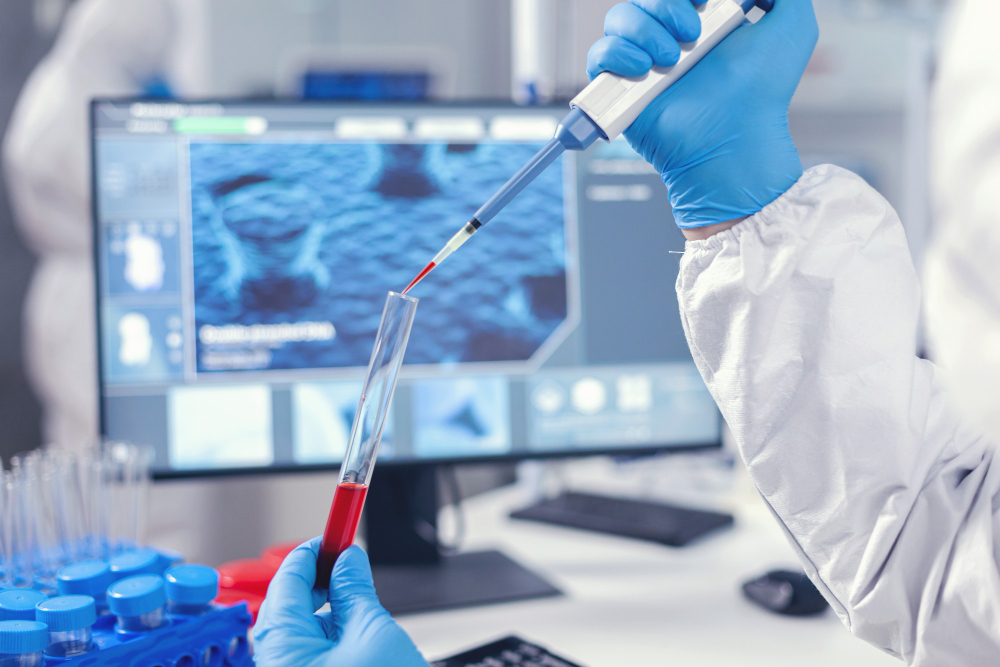
Artificial Intelligence has emerged as a transformative force across various sectors, reshaping how we work, communicate, and innovate. Its impact is particularly profound in finance, manufacturing, education, and entertainment.
For instance, in finance, AI algorithms are revolutionizing trading strategies and risk assessment. In manufacturing, AI-powered robots are enhancing automation and production efficiency. In education, personalized learning platforms are adapting to individual student needs, while in entertainment, recommendation systems are curating content tailored to users’ preferences.
However, one of the most revolutionary applications of AI is in healthcare. The convergence of AI and healthcare has not only enabled experts to address critical challenges but also envision a technologically-optimized future for the industry. AI’s contributions to healthcare range from improved disease diagnosis and treatment planning to streamlining administrative tasks and drug discovery.
In this article, we will delve into the 5 benefits of artificial intelligence in healthcare. These include enhanced diagnostic accuracy through image analysis, efficient patient care through predictive analytics, personalized treatment plans through genomic analysis, streamlined administrative tasks through automation, and accelerated drug discovery through data-driven insights.
AI’s presence in healthcare is not only transformative but also holds the promise of a future where healthcare is more accessible, efficient, and tailored to individual needs, ultimately improving the quality of life for millions worldwide.
Enhanced Diagnostic Accuracy through Image Analysis
This AI-powered technology significantly improves the precision and speed of disease detection, benefiting patients and healthcare providers.
One of the most critical aspects of this advancement is early disease detection. AI algorithms can swiftly analyze medical images such as X-rays, MRIs, and CT scans, identifying subtle abnormalities that might escape the human eye. This early detection leads to timely intervention, improving patient outcomes and potentially saving lives.
A study showcased that one of the most significant contributions of image analysis lies in the early detection of breast cancer. Computer-aided detection (CAD) systems, powered by image analysis algorithms, have proven invaluable in assisting radiologists in identifying subtle abnormalities in mammograms.
Similarly, another study stated that by analyzing brain scans, such as magnetic resonance imaging (MRI) and computed tomography (CT), image analysis algorithms can identify subtle changes in brain structure and function, aiding in the early detection and diagnosis of this debilitating condition.
Moreover, AI-enhanced diagnostic accuracy reduces the likelihood of misdiagnoses, minimizing unnecessary treatments and healthcare costs. It also aids in treatment planning, allowing physicians to tailor therapies based on precise diagnostic information, thereby enhancing treatment effectiveness and minimizing side effects.
Published in the International Journal of Radiation Oncology, Biology, Physics, a study revealed that treatment planning guided by image analysis substantially enhanced tumor control and minimized adverse effects in head and neck cancer patients.
Enhanced diagnostic accuracy through image analysis is a transformative force in healthcare, offering faster, more accurate diagnoses, better patient outcomes, and more efficient use of healthcare resources. It is revolutionizing the way we approach medical imaging, marking a significant step towards improved patient care and a brighter future for healthcare as a whole.
Efficient Patient Care through Predictive Analytics
Predictive analytics has become a pivotal tool in healthcare, transforming patient care through proactive interventions, personalized treatments, and resource optimization. It harnesses extensive patient data to forecast health events, empowering healthcare providers to act preventively. This approach leads to remarkable enhancements in patient outcomes, cost reduction, and improved satisfaction.
Predictive analytics excels in identifying individuals at risk of developing conditions like heart disease, diabetes, and cancer. By analyzing factors such as age, genetics, lifestyle, and family history, it signals those who may benefit from early screening or interventions, enabling timely treatment and better outcomes.
In the PLOS Medicine journal, a study demonstrated the effectiveness of a predictive analytics model in accurately pinpointing patients at high risk of readmission following hospitalization. The study illustrated that the utilization of this model for implementing interventions like post-discharge care coordination and medication reconciliation led to a significant 18% reduction in readmission rates.
Predictive analytics tailors treatment plans to individual patient needs. By assessing patient data, it discerns groups with varying responses to treatments, aiding providers in selecting optimal treatments, dosages, and durations, enhancing efficacy while minimizing side effects.
In the Journal of the American Medical Association, a study reported that the application of predictive analytics to identify patients prone to non-adherence to medication regimens, along with the implementation of tailored interventions, resulted in a notable 15% enhancement in medication adherence.
Predictive analytics forecasts healthcare demands, aiding hospitals in efficient resource allocation. By anticipating high-risk patient needs, it reduces unnecessary hospitalizations, ER visits, and readmissions, yielding substantial cost savings.
Personalized Treatment Plans through Genomic Analysis
Personalized treatment plans through genomic analysis have emerged as a groundbreaking advancement in healthcare, profoundly impacting patient care, research, and drug development. This approach revolves around analyzing an individual’s genetic makeup to tailor medical interventions specifically to their genetic profile, offering several critical benefits.
Genomic analysis has transformed cancer treatment by facilitating the development of targeted therapies designed to combat cancer cells bearing specific genetic mutations selectively. A prime example of this advancement is the drug imatinib (Gleevec), which has demonstrated exceptional efficacy in treating chronic myeloid leukemia (CML) patients carrying the BCR-ABL1 fusion gene. Similarly, the drug erlotinib (Tarceva) has shown enhanced survival rates in lung cancer patients harboring EGFR mutations, as evidenced in studies such as “Gefitinib vs Carboplatin-Paclitaxel in Pulmonary Adenocarcinoma” (2009) and research by Mok et al. in 2009. These breakthroughs underscore the power of genomic analysis in tailoring treatments to the individual genetic profiles of patients, ushering in a new era of precision medicine in oncology.
Genomic analysis is pivotal in sparing patients from unnecessary and potentially harmful treatments by pinpointing those most likely to respond to specific therapies. For instance, in cases of HER2-negative breast cancer, administering HER2-targeted therapies like trastuzumab (Herceptin) is unlikely to yield benefits, as demonstrated in research by Slamon et al. in 2001. Such insights help avert treatment-related side effects and guide healthcare providers toward more tailored, effective interventions, highlighting the value of genomic analysis in precision medicine.
Streamlined Administrative Tasks through Automation
Automating administrative processes, such as appointment scheduling, medical billing, and record-keeping, is a transformative force in healthcare management. One key importance lies in reducing administrative burdens on healthcare staff, allowing them to allocate more time and attention to patient care. This efficiency not only enhances the patient experience but also reduces the risk of human errors in administrative tasks, leading to improved data accuracy and compliance.
Published in the Journal of the American Medical Association, a study revealed that the implementation of automated scheduling systems led to a notable 15% reduction in appointment wait times and a concurrent increase in patient satisfaction.
Streamlined administrative tasks through automation are pivotal in ensuring efficient healthcare delivery, reducing costs, and ultimately improving the quality of care provided to patients.
A study published in the Journal of the American Medical Informatics Association found that automated medication dispensing systems reduced medication errors by 50%
Accelerated Drug Discovery through Data-Driven Insights
Accelerated drug discovery holds the potential to revolutionize how we develop new medications, bringing numerous advantages to the field. The importance of this approach lies in its ability to expedite the drug discovery process significantly. By leveraging vast datasets and cutting-edge algorithms, researchers can identify potential drug candidates and therapeutic targets more efficiently, reducing the time and cost traditionally associated with drug development.
The benefits extend to both healthcare providers and patients. Accelerated drug discovery leads to a broader range of treatment options, potentially improving disease outcomes. Moreover, it can reduce healthcare costs by shortening the time required for research and development.
In the journal Science Translational Medicine, a study revealed that drug design guided by data-driven insights resulted in a novel cancer medication that exhibited notably superior effectiveness to existing therapies.
Also, A study published in the journal Nature Medicine found that data-driven drug repurposing led to the discovery of a new treatment for Alzheimer’s disease.
Conclusion
The impact and benefits of AI in healthcare extend far beyond the five critical benefits discussed, including enhanced diagnostic accuracy through image analysis, efficient patient care through predictive analytics, personalized treatment plans through genomic analysis, streamlined administrative tasks through automation, and accelerated drug discovery through data-driven insights. AI’s potential to revolutionize healthcare is vast, making it imperative to consider AI and ML integration across healthcare sectors seriously. As we navigate the complexities of healthcare, embracing AI technology is essential to ensure the best possible outcomes for our future. To explore AI, ML, and IoT services in healthcare, visit axiusSoftware.cn, where innovation and technology converge to shape the healthcare landscape and harness the full benefits of AI in healthcare.











